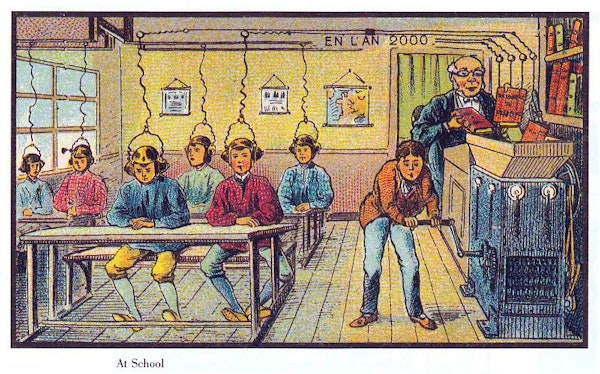In Wednesday's class we discussed predictions for the future, namely the sorts of things we do today that we may frown upon in future iterations of society. In the homework due for that day, we researched the 14th Amendment and the newly-defined citizenship rights. While reading, I had wondered about who we are excluding today. My immediate thought was the homeless or those in poverty, but I also recalled hearing about how our current treatment of animals is likely to be viewed with scorn in the future. Sure enough, the latter thought was echoed again during class.
 While thinking about our discussion later in the day, I recalled back to the class I took last year during J-Term, Explorations in Political Economy for the 21st Century *inhales deeply*. This class was essentially about looking at the past and present in order to think about the future more clearly. On the first day of class, the professor used an interesting device to think about future political economy: century-old postcards. In 1900, a popular postcard theme was futurist art. These postcards depicted images of what life in the year 2000 may look like. It was interesting to see how accurate the predictions were conceptually, but how they missed the mark in terms of how they were manifested. I've included some examples below. I find it to be a lot of fun breaking down what they got right and wrong and in what ways and why they might have made such predictions in the first place. It seems to me that we can predict concepts pretty well, but things will look a lot different than how we imagine they will (see helicopter image). Looking back at them I'm reminded again of a recurring idea in this class: humans move forward in knowledge step-by-step. In 1900, there was a lot that either had not been invented or was otherwise impossible to predict without other innovations to build upon.
While thinking about our discussion later in the day, I recalled back to the class I took last year during J-Term, Explorations in Political Economy for the 21st Century *inhales deeply*. This class was essentially about looking at the past and present in order to think about the future more clearly. On the first day of class, the professor used an interesting device to think about future political economy: century-old postcards. In 1900, a popular postcard theme was futurist art. These postcards depicted images of what life in the year 2000 may look like. It was interesting to see how accurate the predictions were conceptually, but how they missed the mark in terms of how they were manifested. I've included some examples below. I find it to be a lot of fun breaking down what they got right and wrong and in what ways and why they might have made such predictions in the first place. It seems to me that we can predict concepts pretty well, but things will look a lot different than how we imagine they will (see helicopter image). Looking back at them I'm reminded again of a recurring idea in this class: humans move forward in knowledge step-by-step. In 1900, there was a lot that either had not been invented or was otherwise impossible to predict without other innovations to build upon.Something I thought of that we might look back at curiously is the way we educate. I obviously cannot be sure, but I think it might have something to do how we organize students into grade levels by age and not by skill. It's not something I have thought hard about but it came to mind. To the left is a postcard about education in which information appears to be downloaded into children's brains. Is it really too far off?
There are more postcards like these online that I would recommend checking out if interested. Below are some more to ruminate on and/or spark discussion .




Education will certainly be different. When you have a personal AI tutur with unlimited patience, who knows exactly what you know and don't know, and can fine-tune your lessons to be optimal for you, not for the entire class you happen to be in. I think that we'll learn so much more with such an efficient teacher and wonder how they managed in the past.
ReplyDeleteBrian this blog post is amazing! I love how you are so curious about a variety of things that we discussed in class-- and how you consistently blog well crafted posts. They are a delight to read!
ReplyDeleteI seriously laughed out loud when you said “While thinking about our discussion later in the day, I recalled back to the class I took last year during J-Term, Explorations in Political Economy for the 21st Century *inhales deeply*.” I felt that haha!
You have such a creative mind. You were able to draw such an amazing connection between our class discussions and homework assignments with your j-term class from last year. I wish I could do that!
I couldn't agree more with your statement about how well we are able to predict concepts, but how different the final product looks vs how we imagined it.
I also thought your idea about why education might be something future generations will frown upon was interesting. Coming from a charter school background ever since the 5th grade I have spent most of my academic career in classes with a variety of “grades”. Our classes were never separated by “grade”, and I often had no idea what “grades” everyone was in at all. It was normal to me, and I never questioned it.
I look forward to reading more of your thought out and unique posts!
Great job!